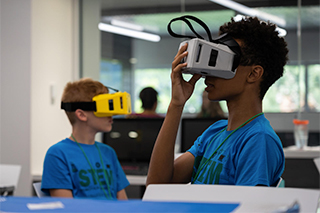Graduate Major
The graduate program for STEM Education is designed for elementary and secondary school educators who teach in the challenging and high-demand fields of science, technology, engineering and mathematics. This program aims to support teachers to integrate content across these disciplines.
The program engages elementary and secondary STEM teachers and other education professionals (e.g., instructional coaches, curriculum specialists) in ways to improve their content knowledge and enhance pedagogical skills for teaching mathematics and science, and prepares them for roles as teacher leaders.
DEGREE OPTIONS
The College of Education offers an online Master of Science in STEM Education program, with a concentration in either Elementary Math and Science or Secondary Math and Science.
What You Will Learn

The Master of Science degree in STEM Education cultivates and trains teachers in STEM programs (science, technology, engineering and math) to create STEM-related experiences that excite and interest students.
Students in this program benefit from online classes that have working teachers in mind. The program is part time, five semesters, and takes a little over a year to complete.
This program prepares educators to inspire and teach students to be successful in STEM courses, thereby increasing the number of individuals capable of filling critically important STEM-related career positions. Students must choose a concentration to complete this program – either Elementary Math and Science or Secondary Math and Science.
REQUIREMENTS FOR A MASTER IN STEM EDUCATION

Students who enroll in this course must already be working in a STEM-related educational setting at time of admission. Two years of experience at time of application is preferable but not required.
The total minimum hours required to complete the program is 31 credit hours, with 15 hours dedicated to core requirement classes and 15 hours dedicated to a chosen concentration -- either Elementary Math and Science or Secondary Math and Science. In lieu of the Comprehensive Exam, students must successfully complete a STEM education portfolio during their final semester.
Always refer to the Graduate Catalog for degree requirements. Students are urged to consult with the STEM Education advisor to create the most beneficial set of courses.
QUESTIONS?
For questions about the program, contact Dr. Karina Hensberry, the STEM Education Program Area Coordinator, at khensberry@usf.edu.